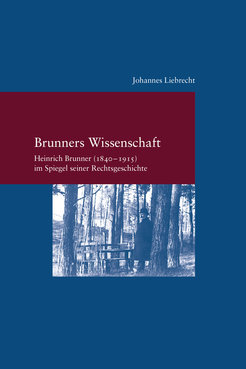Brunners Wissenschaft
Heinrich Brunner (1840–1915) im Spiegel seiner Rechtsgeschichte

Heinrich Brunner (1840–1915) im Spiegel seiner Rechtsgeschichte
Studien zur europäischen Rechtsgeschichte 288
[Brunner’s Science]
Johannes Liebrecht
Studien zur europäischen Rechtsgeschichte 288
Frankfurt am Main: Klostermann 2014. X, 363 p.
ISSN 1610-6040
ISBN 978-3-465-04220-4
Within the 19th-century German Historical School, a German-language legal-historical reflection developed – much like the historiographic thinking in general – that was divided between the Romanic camp, on the one side, and a Germanic camp, on the other. At the same time, the Germanic legal historiography experienced its most significant flourishing in the last third of the century. The leading research figure during this time was the German-Austrian Heinrich Brunner. Even today he is considered the embodiment of legal historical scholarship.
This study undertakes to analyze Heinrich Brunner’s works, his axioms, as well as his institutional image of science. Brunner’s proximity to the conceptual world of bourgeois realism of the Prussian persuasion is portrayed in addition to his attitude toward a number of scientific ideals in the Wilhelminian Empire. Given that the thought and impact of this luminary figure are carefully reconstructed and ordered, it is now for the first time possible to take a more in-depth look at the inner structure of German historiography upon the threshold to the 20th century. The highpoint of the discipline made these years, also thanks to Brunner, not just in the German-speaking realm but also internationally speaking, to a key period when it comes the scientification of legal historiography.
This work was awarded with the Hermann Conring Prize 2014.
